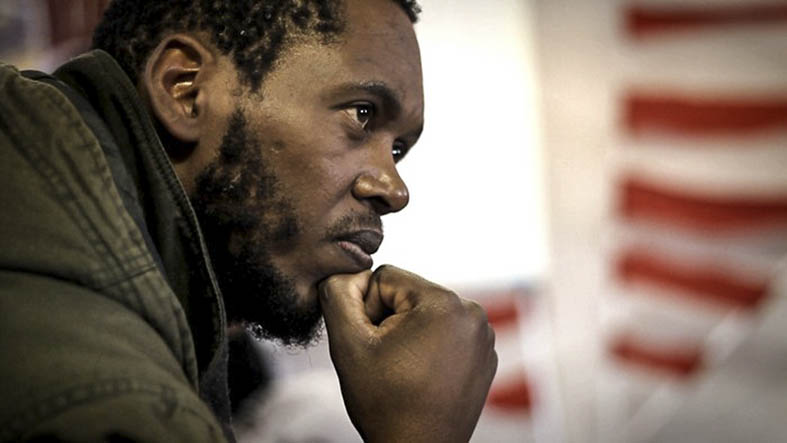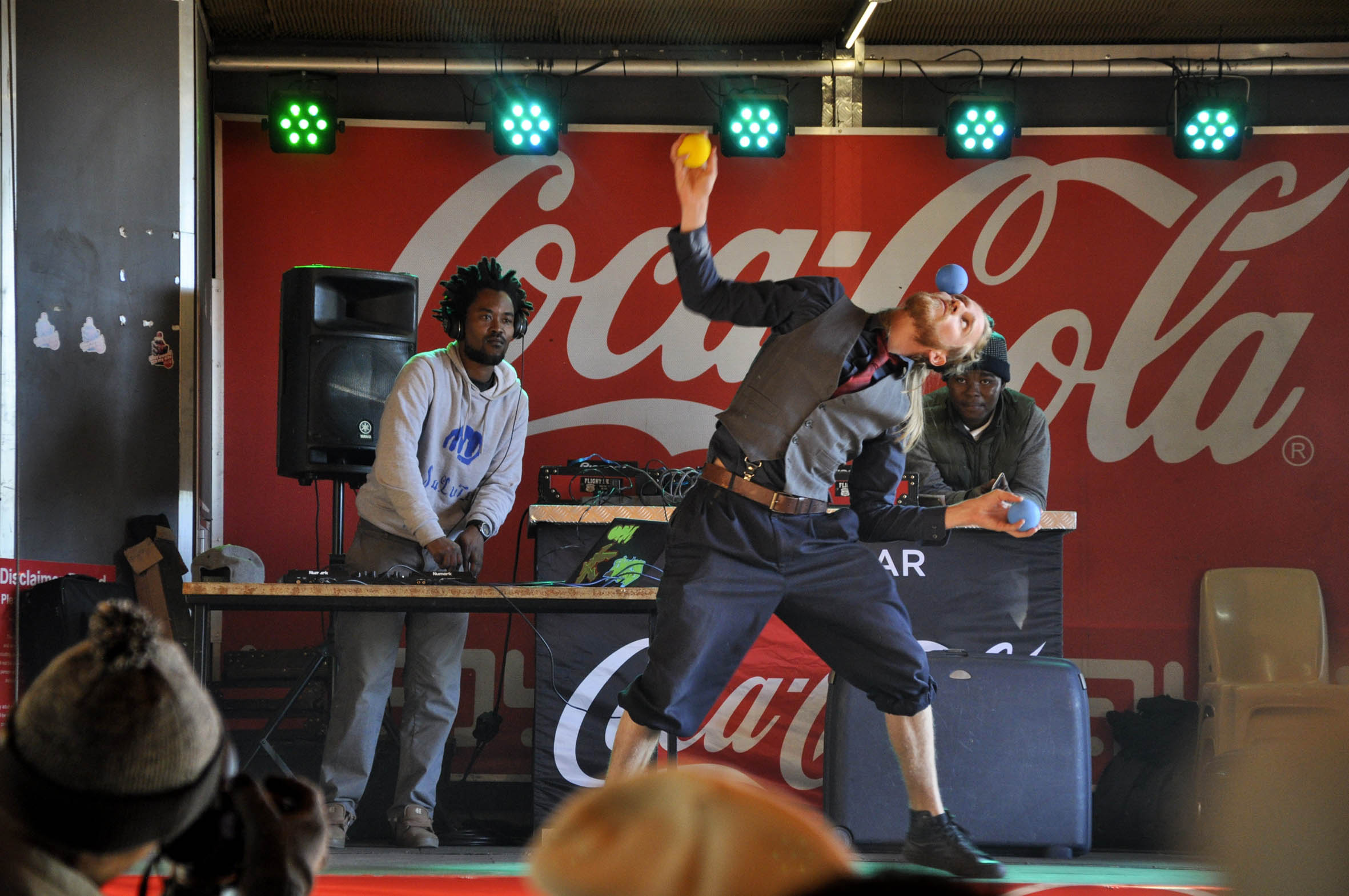Some spellbound young patrons watching a performance at the Fingo Festival Square in Makhanda. An important part of the festival is introducing creative professions to children. Photo: Michelle Hodgkinson
Throughout the National Arts Festival (NAF), locals and festivalgoers agreed on one thing: every day of the NAF blurs into the next. Friends struggle to remember whether they went to the Standard Bank Jazz Lounge or KwaMandisa yesterday, the day before or that oooother day. Housemates don’t remember who the last person to do the dishes was and the order in which they watched shows isn’t clear, because everything is as vivid as it is vague.
If the festival all feels like one day, then the second-last day is when the clock strikes 10pm. The merchants who line the streets with tents have begun folding them away and are slowly packing up the little merchandise they still have. Suitcases are rolled downhill across town to the Frontier Country Hotel bus pickup point. The crowds coming in and out of shows are shrinking.
At this time, I drive out of what Makhanda locals refer to as the city centre, down Beaufort Street and into Fingo Village, where I meet Xolile Madinda.
Madinda (39) is a playwright, social activist and hip-hop artist who dedicates his work to transforming colonial strongholds while creating new spaces. He was director of Save Our Schools and Community in the Eastern Cape, and participated in a theatre piece that showcased at the NAF in 2008 called Ndiyindoda, directed by Theresa Edelmann and Jason Bantjies. At the moment, he chairs Around Hip-Hop, an organisation that uses hip-hop to address Makhanda’s social malaises.

[Xolile Madinda, founder of the Fingo Festival, has been bringing audiences into Makhanda’s townships and helping to narrow the gap between mainstream and community theatre. (Photo: Leila Dee Dougan)]
On this day, I speak to him in his capacity as the founder of the Fingo Festival, a community-focused arts festival held at Fingo Square during the National Arts Festival. Since its establishment in 2011, this sub-festival has seen locals curating a home for artistic expression that fits the context of Makhanda’s townships.
“Fingo Festival seeks to teach black parents that art can be a way of life. Secondly, there’s been a perpetual complaint that the [National Arts] festival is for the elite. In 2010, the World Cup happened at the same time as the NAF. When I looked at the township, there was activity, big time! Everybody was experiencing the World Cup. So I thought: if government was making sure that everybody was experiencing the World Cup, then there should be room to bring the festival to the location.
“We needed to remember that we’re on our own. We needed to remember that the [main] festival was not started for us, by us, so let’s not complain about something we didn’t start. Let me start my own thing so I can look at myself with clear understanding and judgment of what I am doing,” says Madinda.
“In 2011, we started Fingo: a creative get-together with people from Fingo, Joza, Extension 9 and other places.”
Depending on the amount of funding it receives, every year the Fingo Festival hosts talks, exhibitions, workshops and children’s programmes alongside music and theatre performances for between five and seven days.
“We don’t sell anything. Everything is free. People don’t understand; they think it’s a waste. But then, how do you charge; who do you charge? Even though they visit, our target is not the buying audience that is in town,” explains Madinda, when asked whether the festival brings in any income to supplement its budget.

[Sustainable scene: A juggler shows off his skills at the Fingo Festival. Initiatives are now underway to keep Makhanda’s arts practitioners active and busy throughout the year. (Photo: Michelle Hodgkinson)]
In 2012, the Fingo Fest was integrated into the main programme of the NAF to affirm the fellowship between the townships and suburban areas. Some years ago, Tony Lankester, the NAF’s chief executive, said the festival was open to partnering with the community: “We have launched, together with the Fingo Festival, a whole initiative in Fingo Village. We put out a Coca-Cola truck and gave them some cash, because they came to us with a great idea.”
This year, the Fingo Festival was five days long and ran on a R65 000 budget, which the organisers stretched to facilitate the programme, pay marshals and feed some children in addition to their daily activities.
“It’s been a great year; it’s been a great five days. Fingo is beautiful. It’s been beautiful. Fingo Festival is growing and we’re growing an idea without resources. But the idea is beyond resources,” says Madinda with downcast eyes and a tired smile.
Although the Fingo Festival may be in the limelight, drawing festivalgoers to Makhanda’s townships, it does not stand alone. Theatre in the Backyard brings audiences into the intimate setting of a township home’s backyard to narrow the gap between mainstream and community theatre. In Makhanda, this initiative puts on productions grounded in the reality of the townships’ everyday experiences. This year, the programme featured Wait … Linda and Is He Mad?, both directed by Mhlanguli George. Both shows were well received.
But what happens when the posters that flood the walls are removed, the stalls disappear and the visitors return home? What happens to the local artist, who is not a student at the university currently known as Rhodes? How do they use their craft to sustain them for the remaining 354 days when there isn’t an international audience? Do the organisers of the NAF keep in touch with them?
As an artist who grew up and still lives in Makhanda, Madinda — or Tat’ X, as the young artists refer to him — has in-depth experience of what happens to local artists outside festival season.
“Yho. You know, it’s the same for artists. It doesn’t make a difference. If you’re an artist who didn’t get a chance to be in anyone’s production, the year does not change. But if you did get to showcase your work, it’s the driest time ever outside the festival. It’s the loneliest and roughest time for artists, because during fest it’s like Christmas; everyone comes to Grahamstown and they all love us. When it’s over, it’s easy to become idle. Artists in Makhanda depend on Rhodes. So if Rhodes University closes, you also close. That’s why it’s hard for artists to come and stay in Grahamstown, unless you’re here to study,” he says.
As a response, Around Hip-Hop has acquired a space in an industrial area just outside Makhanda, in a bid to sustain artists beyond the 11-day festival. The official name of the space is Around Hip-Hop Live Café — situated in Rautenbach Road, Makhanda — but those who have been there have endearingly nicknamed it the Black Power Station.
Funded by the NAF, the industrial space with a high roof and grey concrete finishings has a stage fitted with a lone mic, a reading corner, some second-hand couches, a gramophone and DIY wooden furnishings.
“It’s an old garage we’ve renovated. There we’re going to start classes and have performances, and all other creative mediums will have a home there. The idea is making it home for our artists, so entrance into the space is a book; if you don’t have money, you bring a book. But we’ll charge a small fee for some events. That money will be given to the performers, lecturers and facilitators to thank them for their time. It may not be much, but they will be working on their craft while putting some money in their pockets. Last week, we opened it officially,” says Madinda.
As the sun sets on this year’s NAF, Fingo Village, Joza and Extension 9 residents busy themselves with their next hustles. On the other side of Makhanda, the locals are focused on the flotsam left by the 11-day one-night-stand: a sea of plastic bags and containers, as well as empty, damp boxes and dishevelled posters. So they congregate in the small town’s Church Square and quietly begin to fill their rubbish bags, with the hope of restoring Makhanda to some semblance of order.